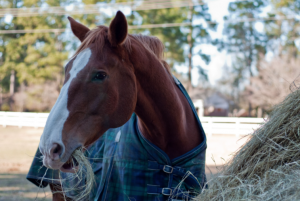 As the warm summer months draw to a close, horse owners stock up on hay for the winter. The hay man has a variety of hays available, including the yellow or brown, less leafy fall hays. Although they might not be as physically attractive and green as the hay harvested earlier in the summer, there are many benefits to late-season hay for horses.
As the warm summer months draw to a close, horse owners stock up on hay for the winter. The hay man has a variety of hays available, including the yellow or brown, less leafy fall hays. Although they might not be as physically attractive and green as the hay harvested earlier in the summer, there are many benefits to late-season hay for horses.
Did you know these facts about late-cut hays?
- Late-cut hays have less water-soluble carbohydrates (i.e., glucose, sucrose, fructose, and fructans) and are therefore better for obese, insulin sensitive/resistant horses, and those diagnosed with equine metabolic syndrome.
- They have more structural carbohydrates that are fermented in the large intestine to provide energy in the form of volatile fatty acids (e.g., lactate, acetate).
- Late-cut hays can provide enough energy and nutrients (i.e., carbohydrate, protein, minerals, vitamins, etc.) for most horses to thrive, even if pregnant, lactating, or exercising.
- They typically contain fewer weeds than early-cut hay.
- Late-cut hays are generally less palatable, which may make colic less likely to result than when feeding tasty early-cut hays.
Regardless of what hay type is ultimately selected, follow the basic rules for selecting good-quality hay. For example, never feed moldy or dusty hay to horses. Particularly those with respiratory issues. Do not feed hay with blister beetles or a preponderance of other bugs. Be aware that not all hays and horses marry well. High-energy hay, such as most alfalfa, might be great for young, growing horses but not elderly, barren mares.
Additionally, all hays and even cuts of hay from the same field vary depending on the weather conditions in which they were grown and harvested. This means that every type and cut can vary markedly in nutritional content. This is where hay analysis can come in handy. It provides a consistent and healthy hay-based diet to your horses year-round.
Hay analysis may also benefit obese and insulin sensitive/resistant horses. If the hay is high in water-soluble carbohydrates, hay soaking can remove those excess carbohydrates.
In short, choose your hay wisely, preferably with the assistance of an equine nutritionist or veterinarian.
Would you more information about the benefits of late-season hay for horses? Contact us at J & J Farms by clicking here!
Article brought to you by KER.
